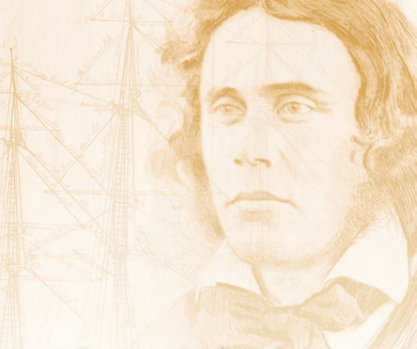The Man Who Dared Defy the Boston Brahmins

One hundred and seventy-five years ago this month, a new lawyer sat in his empty Boston office awaiting his first clients and first book. Twenty-five-year-old Richard Henry Dana, Jr. had written an account of his harrowing voyage around Cape Horn to the remote coast of California in the hope it would provide him “a share of maritime business.” Anxious to have his book’s publication coincide with the start of his law practice, Dana accepted the publisher Harper’s final offer of $250 for the copyright.
 Two Years Before the Mast went on sale in September 1840. A classic of American literature (“unmatchable” said Herman Melville), it has never been out of print. But Dana’s voyage did more than provide material for a great book: it shaped the moral sensitivity of one of America’s most zealous defenders of freedom and human dignity.
Two Years Before the Mast went on sale in September 1840. A classic of American literature (“unmatchable” said Herman Melville), it has never been out of print. But Dana’s voyage did more than provide material for a great book: it shaped the moral sensitivity of one of America’s most zealous defenders of freedom and human dignity.
“I must be a lawyer it seems,” Dana said— a reasonable apprehension in a family that had produced three generations of lawyers by the time of Dana's birth in 1815. All had gone to Harvard and so did Dana, “as a slave whipped to his dungeon.” But in 1833, his eyesight impaired by measles, Dana did not return for his junior year. It was then, as he “lingered about at home a ... dissatisfied creature,” that Dana hit upon a plan “to relieve myself from ennui.” He would embark on a voyage before the mast.
Dana's family and friends were aghast. Dana's determination to become a common seaman in the unimaginably squalid conditions of a merchant ship’s forecastle provoked nearly as much dismay as if he had volunteered to be a slave. As events were to prove, the comparison was not far-fetched, for the authority of a sadistic ship captain was as absolute as the master of a plantation.
Dana was as unprepared for what lay before him as anyone who has ever taken a leap into the unknown. He was the eldest son of the fifth generation of a family that had spent two centuries in one town in a country with one coast. He was a helpless landlubber on a ship with a despotic captain. Miserably seasick, he was ordered to climb a swaying main mast. Dana realized “that if I showed any... want of spirit I should be ruined at once.”
But Dana was exposed to more than the elements. He lived with men whom his college peers would never have met, much less spoken to. It changed Dana's sense of “the best people.” The Sandwich Islanders he befriended when hauling cattle hides on the California coast “were the most interesting, intelligent, and kind-hearted people that I ever fell in with.” In a debate with a sailor whom he was certain had little education—“if indeed he had any at all”—Dana was astonished by the power of the seaman's intellect, which far exceeded that of Dana's Harvard classmates.
When Dana watched helpless and horrified as the ship's captain brutalized a crewmember (“A human being— fastened up and flogged like a beast!”), he vowed that if ever given the means, “I would do something to redress the grievance and relieve the suffering of that poor class of beings of whom I then was one.”
Dana returned to the Brahmin class in which he had been born and bred but he kept his vow. When he extended his advocacy to the defense of fugitive slaves and their rescuers, “proper Boston” boycotted the young lawyer’s practice. Denounced by Boston elites for “biting the hand that feeds him,” Dana was told to keep silent or leave the city. Dana replied “that principle would do in a club but not in a community of equal rights.... [it] came from persons who thought Boston was a club— their club.”
In the aftermath of the Civil War, many Bostonians did not care to remember a time when, in the words of Charles Francis Adams. Jr., social and business Boston was “in its heart, and almost avowedly, a pro-slavery community.” By 1890 Adams— Dana’s first biographer—wrote that the social, economic, and political pressures Dana confronted were “almost forgotten, and in a few more years, he who speaks the truth about them will be denounced as a maligner.”
Dana came to think of Two Years Before the Mast as “a boy’s work done before I came to the Bar” and his voyage as a “parenthesis” in his life. But his odyssey carried him far beyond those whom he described 175 years ago as persons “who never walked in but one line from their cradle to their graves.” Dana’s legacies to literature and law remind us that sometimes the most hazardous voyage is the one we do not take.